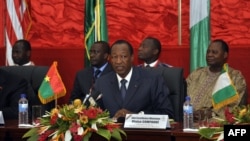Representatives of the Economic Community of West African States (ECOWAS), the African Union, Mali and bilateral and multilateral partners were expected to conclude a five-day meeting in Bamako on deployment of an African-led military to end Islamist control of northern Mali.
At the same time, there are reports that a top Malian government official and a delegation from the Islamist extremist group controlling northern Malian territory were meeting in Burkina Faso’s capital, Ouagadougou, for talks with President Blaise Compaore, the ECOWAS mediator in the Malian crisis.
Sonny Ugoh, ECOWAS communication director, said the meeting in Bamako is in line with UN Security Council Resolution 2071, which mandates ECOWAS with devising a plan for military intervention within 45 days from October 12th.
“The outcome of that meeting will go before the extraordinary session of the ECOWAS Defense Staff, which will also take up Mali this week, after which their recommendations will go before the ECOWAS Mediation and Security Council which will meet in Abuja on the 10th [November], and their recommendations will go to heads of state and government who will also meet in Abuja on the 11th,” he said.
Meanwhile, there were reports that a top Malian government official and a delegation from the Islamist extremist group controlling northern Mali were in Burkina Faso’s capital, Ouagadougou, for talks with President Blaise Compaore, the chief ECOWAS mediator in the Malian crisis.
Ugoh said the reported meeting is in line with ECOWAS’s objectives of finding a peaceful resolution to the Malian crisis.
“The ECOWAS approach has been to talk about the possibility of engagement with the parties in Mali and then the possibility of deployment if dialogue fails. And, the mediator, in this case, President Blaise Compaore, is perfectly at liberty within the context of his mandate to explore other opportunities in order to provide them [Islamist extremist groups in the north] a solution through dialogue,” Ugoh said.
At the same time, Ugoh said ECOWAS is moving ahead with preparations for the deployment of an African-led intervention force.
“We have always said that we have a two-track approach to resolving the crisis in Mali, the dialogue component and the military component, and, for us, we prefer the dialogue component. The dialogue component is cheaper in the sense of cost in lives and property. But, like I said, President Blaise Compaore is at liberty to explore whatever options he has,” Ugoh said.
Once the ECOWAS Mediation and Security Council adopts the plan for military intervention in Mali, it will then be sent to the UN Security Council by mid-November for another resolution authorizing the deployment of an Africa-led intervention force in Mali.
At the same time, there are reports that a top Malian government official and a delegation from the Islamist extremist group controlling northern Malian territory were meeting in Burkina Faso’s capital, Ouagadougou, for talks with President Blaise Compaore, the ECOWAS mediator in the Malian crisis.
Sonny Ugoh, ECOWAS communication director, said the meeting in Bamako is in line with UN Security Council Resolution 2071, which mandates ECOWAS with devising a plan for military intervention within 45 days from October 12th.
“The outcome of that meeting will go before the extraordinary session of the ECOWAS Defense Staff, which will also take up Mali this week, after which their recommendations will go before the ECOWAS Mediation and Security Council which will meet in Abuja on the 10th [November], and their recommendations will go to heads of state and government who will also meet in Abuja on the 11th,” he said.
Meanwhile, there were reports that a top Malian government official and a delegation from the Islamist extremist group controlling northern Mali were in Burkina Faso’s capital, Ouagadougou, for talks with President Blaise Compaore, the chief ECOWAS mediator in the Malian crisis.
Ugoh said the reported meeting is in line with ECOWAS’s objectives of finding a peaceful resolution to the Malian crisis.
“The ECOWAS approach has been to talk about the possibility of engagement with the parties in Mali and then the possibility of deployment if dialogue fails. And, the mediator, in this case, President Blaise Compaore, is perfectly at liberty within the context of his mandate to explore other opportunities in order to provide them [Islamist extremist groups in the north] a solution through dialogue,” Ugoh said.
At the same time, Ugoh said ECOWAS is moving ahead with preparations for the deployment of an African-led intervention force.
“We have always said that we have a two-track approach to resolving the crisis in Mali, the dialogue component and the military component, and, for us, we prefer the dialogue component. The dialogue component is cheaper in the sense of cost in lives and property. But, like I said, President Blaise Compaore is at liberty to explore whatever options he has,” Ugoh said.
Once the ECOWAS Mediation and Security Council adopts the plan for military intervention in Mali, it will then be sent to the UN Security Council by mid-November for another resolution authorizing the deployment of an Africa-led intervention force in Mali.






